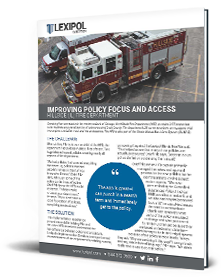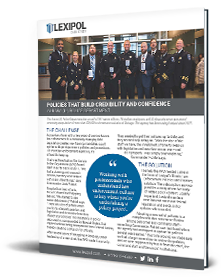The Challenge
When Jeffrey Pilz took over as chief of the Hillside Fire Department, the department had policies in place—lots of them. Two huge binders housed policies covering nearly all aspects of the department.
“We had policies that covered everything that came up, policies that had people’s names on them, if you know what I mean,” Chief Pilz says. Although some of the policy content was effective, Chief Pilz knew the HFD could do better. “Policies make or break your department,” he says. “If you don’t have a good foundation of policies, everything breaks down.”
The Solution
Chief Pilz heard about Lexipol through the city’s workers’ compensation program, which provides grants to encourage departments to implement Lexipol. “That was a no-brainer to me; it made a lot of sense,” Pilz says. He purchased Lexipol’s Illinois Fire Policy Manual and Daily Training Bulletin service, along with a quick-start implementation package to get the project up and running.
The implementation assistance proved essential in helping Pilz and the other HFD members understand the key difference between policy and procedure. Lexipol’s Implementation Services team performed an assessment of the department’s existing content, comparing it against the Lexipol Illinois Fire Manual. “That helped us see that many of our policies are actually procedures,” Chief Pilz says. “And that in turn got us started on condensing the manual.”
Chief Pilz and an HFD captain primarily managed the review and approval process for the new policies, but he didn’t hesitate to involve subject matter experts. “When we were reviewing the Controlled Substances Policy, I had our EMS coordinator review it, and we also had hospital personnel look at it,” he says. He stresses the need to communicate clearly with reviewers what parts of the policy are subject to change and what parts need to remain unchanged because they are based on federal or state law—which is easy to do in the Lexipol system because of the policy section labels. “When they ask, ‘Why are we doing it this way?’ I can go back and say, this is federal language,” Pilz says. “We didn’t really have a way to do that before.”
Lexipol’s mobile app facilitated rollout of the new policies. As policies were approved, Chief Pilz issued them to the firefighters, who reviewed the new policies on their mobile devices. “Then the captains followed up with those who hadn’t completed their policy acknowledgements,” he says. The app also makes it easier for HFD firefighters to access the policies. “The app is great—I can punch in a search term and immediately get to the policy,” Chief Pilz says.
The Results
The reception at the line level has been positive— which Chief Pilz attributes to Lexipol’s credibility in the eyes of the firefighters. “Anyone who’s done anything with training knows Gordon Graham and Billy Goldfeder,” he says. “When my firefighters ask, ‘Who wrote this?’ I can say it’s not some lawyer who’s just trying to make a buck and doesn’t care about you. Gordon and Billy are vested in the fire service, in risk management. As soon as the members know this is coming from them, they buy in. That credibility can be really important in building support for the change.”
Chief Pilz points to two broad benefits of implementing Lexipol. “Lexipol gives you valuable documentation of policy acknowledgement and related training,” he says. “For example, I can show that we issued the sexual harassment policy, that the firefighter acknowledged it, and then that they took the related training bulletins. On a chief level, that’s very important.”
Second, implementing Lexipol has helped the HFD condense their policies. “What we had before was the full meal—appetizer, soup, salad, entrée, dessert. Really all you need is the meat,” Chief Pilz says. “We took some policies that were 12 pages long and condensed them to two pages. It covers what we need to without losing the firefighter’s attention. Anytime you can condense something, you make it easier for the firefighters to comprehend and use.”




